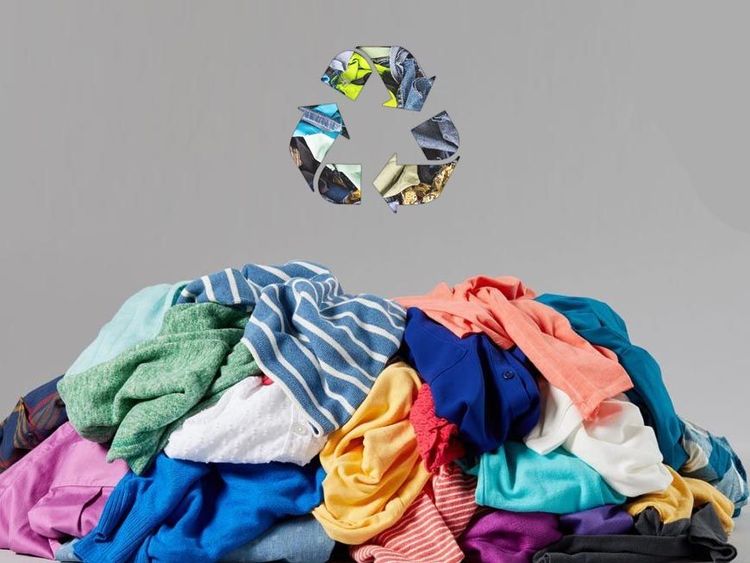
Textiles (141)
The Northern European fashion retailer C&A recycles denim leftovers from its own factory in Moenchengladbach, Germany into a new flooring material.
Specially designed for retail environments, the flooring material is made by recycling about 80 per cent of leftovers that include jeans fabrics, cork underlays from the bottle industry and wooden boards processed using natural products such as vegetable fats and natural rubber. The fibers are produced by the Swiss family-run company Lico using natural products such as vegetable fats and natural rubber. Moreover, the company uses energy from renewable sources, including a photovoltaic system and local hydropower plants.
The jeans flooring has been awarded with Environment Product Declaration (EPD) and the Blue Angel Award. It also won the Green Collection Award 2023.
The company providing the jeans scraps, the C&A FIT (Factory for Innovation in Textiles), is a pioneering facility in Mönchengladbach, Germany. Opened in 2021, the factory manufactures around 1,000 pairs of jeans every day using advanced automation, digitalisation and electricity from renewable sources. The factory also conserves water by using only 10–15 liters per a pair of jeans compared to the industry standard of 70 liters.
Lenzing Group’s subsidiary, LD Celulose International GmbH, has successfully issued Green Notes worth $650 million. The notes, which mature on January 25, 2032, have a coupon rate of 7.95 per cent per annum and were in high demand among institutional investors.
This funding is part of a broader $1 billion financing strategy for LD Celulose S.A. (LDC), a joint venture between Lenzing and Duratex. It also includes a $350 million syndicated term loan. The proceeds from the Green Notes, along with the term loan and cash reserves, will be used to repay existing financial obligations and fund eligible green projects in line with the company’s Green Financing Framework.
Rohit Aggarwal, CEO of Lenzing Group, emphasized the company's commitment to sustainability, noting that the strong investor interest reflects Lenzing's leadership in sustainable textiles and nonwovens. CFO Nico Reiner added that the transaction transitions LDC's financing to a standalone corporate structure, supporting its position as one of the largest dissolving wood pulp plants globally, with a capacity exceeding 500,000 tons annually.
The Green Notes, issued by LD Celulose International GmbH and guaranteed by LDC and LD Florestal SA, will be listed on the Singapore Stock Exchange. This strategic move further aligns with Lenzing’s vision of enhancing sustainability in the textile and nonwovens industry.
At the recently concluded Garment Technology Expo (GTE) 2024 in Bengaluru, Brother International (India) unveiled its latest range of flatbed and multi-needle machines, targeting emerging entrepreneurs in the garment industry.
With a focus on small business owners, fashion students, and boutique operators, Brother India caters to the rising demand for customised monogramming and fashion designs by offering advanced machines that combine versatility with precision.
Highlighting the company’s new machines that meet the needs of small-scale manufacturers, Rudra Pratap, National Sales Head, says, these products are ideal for small businesses looking to expand their creative capabilities in a competitive market.
The products showcased by Brother India at GTE 2024 were designed to tap into current market trends, particularly the growing demand for custom apparel and monogramming.
Addressing the growing competition from Chinese machines, Pratap points out, Brother India’s machines stand out due to their superior quality, cutting-edge technology, and reliable sales and service support. Besides providing advanced machines, the company also offers adequate after-sales services to help improve the machines’ productivity.
Brother India also conducts comprehensive training programs to ensure entrepreneurs operate the machines efficiently and upgrade their skills regularly. Present in India since 2006, Brother International operates 15 warehouses across the country with a robust distribution network.
Ukrainian denim brand Kseniaschnaider, founded by Ksenia and Anton Schnaider, has been honored with PETA Germany’s 2024 Vegan Award. The brand’s Chewbacca jeans, featuring their signature ‘denim fur,’ won in the category of Best Vegan Pants. This unique material is made from reworked vintage denim and frayed offcuts, offering a sustainable and animal-friendly alternative to traditional fur.
PETA Germany praised Kseniaschnaider for its dedication to sustainability and its refusal to discard even the smallest fabric scraps. Harald Ullmann, co-founder of PETA Germany, applauded the brand’s commitment to ethical fashion, stating that the collection exemplifies how vegan fashion can benefit animals, people, and the planet.
The PETA Vegan Award, now in its 11th year, celebrates brands like Kseniaschnaider that create innovative, animal-free fashion. Other 2024 winners include GmbH, Armedangels, and Amina Muaddi for their eco-conscious designs.
Embarking on a transformative journey, RSWM is expanding the capacity of its knitting unit besides embarking on other gradual capacity expansions. Having ventured the circular knitting fabrics market with an investment of Rs 80 crore, RSWM offers a range of innovative and high-quality knitted fabrics such as Single Jersey, Interlock, Rib, and Fleece at its new venture, LNJ Knits.
RSWM aims to capitalise on the $206 billion global knits market with its 4,800 mmtpa Banswara Plant in Rajasthan. It also aims to acquire an additional capacity of 4,300 mtpa.
The company has improved its denim division significantly and aims to further enhance the capacity of its division. RSWM also plans to foray into the garments segment and modernise equipment across all units. It has earmarked an investment of Rs 410 crore for these expansions.
In FY24, RSWM achieved net sales of Rs 4,057 crore. The company operates 12 manufacturing plants in Rajasthan, equipped with 6.25 lakh spindles, 172 looms, and 95 circular and flat knitting machines, ensuring high-quality textile production and timely global delivery. RSWM's annual production includes 1,21,000 mt of greige yarn, 24,000 mt of melange yarn, 32,000 mt of dyed yarn, 32 million meters of denim fabric, over 9,000 mt of knits fabric, and 43,000 mt of green fiber. The company employs over 10,000 skilled workers across its facilities.
In a significant move, the 80th Annual General Meeting of Lenzing AG, held on Thursday, April 18, 2024, saw the discharge of members from both the Managing and Supervisory Boards for the 2023 financial year. Additionally, the remuneration for Supervisory Board members for the 2024 financial year was established pre-emptively. KPMG Austria GmbH Wirtschaftsprufungs- u. Steuerberatungsgesellschaft secured the role of auditor for both the annual and consolidated financial statements for the fiscal year 2024.
Election results were also announced, marking transitions within the Supervisory Board. Markus Furst stepped down from his position at his own behest, having served since 2021. Cornelius Baur was elected as a new member, while Melody Harris-Jensbach’s tenure was extended until the 2028 General Meeting. The Supervisory Board now comprises ten members, with Cord Prinzhorn, MBA, elected as Chairman and Stefan Fida as Deputy Chairman in the subsequent constitutive meeting.
These developments reflect strategic shifts within Lenzing AG’s leadership structure, with an emphasis on continuity and fresh perspectives. The inclusion of new members and the extension of mandates signal a commitment to diverse expertise and sustained governance. Such changes could potentially influence the company's direction and decision-making processes in the coming years.
Thai Acrylic Fibre Co., Ltd (TAF) is poised to make waves at Spinexpo, set to unfold at the World Expo Exhibition & Convention Centre in Shanghai from March 5-7, 2024. With a focus on advancing industry collaborations, TAF's participation underscores its pivotal role in driving sustainability through its innovative Regel technology. Beyond a mere display, TAF's presence at booth V04 serves as a clarion call for sustainable practices within the textile realm.
Regel takes center stage in TAF's repertoire for its sustainability approach. Crafted from recycled acrylic fibre, Regel comes in 50 per cent and 75 per cent recycled content variants. What distinguishes Regel is its ability to match the quality and performance of virgin acrylic fibre while significantly reducing the carbon footprint of textile production. Holding both GRS certification and bluesign Approved designation, Regel exemplifies TAF's unwavering commitment to environmental stewardship and innovative sustainability.
TAF's presence at Spinexpo transcends mere exhibition; it's an avenue to connect with industry luminaries, trailblazers, and potential collaborators. Tuhin Kulshreshtha, TAF's head of marketing, underscores the event's significance, emphasizing, "The Spinexpo platform offers invaluable networking opportunities, fostering partnerships that drive innovation and sustainability." With an eye toward the future, TAF seeks to leverage this premier stage to cultivate meaningful dialogues and partnerships shaping the textile landscape.
In an evolving textile landscape, sustainability takes precedence like never before. TAF's participation in Spinexpo 2024 signals a seismic shift toward eco-conscious production methods and materials. By showcasing Regel and engaging stakeholders worldwide, TAF not only contributes to the sustainability discourse but also sets new benchmarks for environmental responsibility in textiles. This exhibition stands as a pivotal juncture, heralding a collective stride toward a greener, more sustainable future.
TAF's presence at Spinexpo 2024 transcends the exhibition floor, marking a significant stride toward textile sustainability. By fostering collaborations and spotlighting the success of Regel technology, TAF catalyzes a shift toward a greener, more sustainable industry ethos. As we reflect on this momentous event, one thing is clear: the future of textiles hinges on innovation, sustainability, and collaborative efforts. TAF's participation in Spinexpo 2024 serves as a rallying cry, inspiring others to join the movement toward a more sustainable tomorrow.
In the 2022-23 seasons, Brazil witnessed a record-breaking increase in cotton production, propelled by higher cultivation and production, as reported by the Center for Advanced Studies on Applied Economics (CEPEA). During off-season, cotton prices in Brazil experienced a notable decline from January to May, influenced by weakened demand and optimistic expectations for a bountiful crop. Export activities slowed down in early 2023, attributed to prices that sellers found unattractive.
Monthly average prices exhibited stability between May and June, followed by reaching the lowest point of the year in July. Subsequently, fluctuations in monthly averages decreased as a result of rising exports, which helped alleviate the domestic surplus. The report highlighted challenges in 2023, including logistical issues and increased transportation costs due to declining product quality.
The CEPEA/ESALQ Index for cotton recorded a significant drop of 24.4 per cent in 2023. The cotton cultivation area expanded by 4 per cent, reaching 1.664 million hectares in the 2022-23 period, according to CONAB. Productivity experienced a notable increase of 19.5 per cent, reaching 1,907 kg per hectare. Overall production saw a substantial rise of 24.2 per cent, reaching 3.173 million tons.
Globally, supported by heightened supply from China, India, and Brazil, the USDA reported 1.8 per cent increase in global cotton production to 25.395 million tons in 2022-23. Notably, production in the US and Pakistan witnessed a significant decrease during this period, according to the association's findings.
Maharashtra is making grand plans to transform its textile industry, aiming to attract a staggering Rs 25,000 crore investments through a series of bold mergers and a focus on sustainability.
In a bid to streamline bureaucracy and foster a thriving textile ecosystem, the state will merge three existing corporations – the Maharashtra State Handloom Corporation, Maharashtra State Powerloom Corporation, and Maharashtra State Textile Corporation – into a single entity: the Maharashtra State Textile Development Corporation (MSTDC). Modeled after the successful MIDC, the MSTDC promises a fertile ground for textile businesses to flourish.
The state is also merging the Textile Commissionerate and Silk Directorate into the Textile and Silk Commissionerate, eliminating redundancies and creating a more efficient oversight body. These strategic moves are aimed at not just boosting cotton production capacity and attracting big-ticket investments, but also generating 5 lakh new jobs, weaving a brighter future for the state's textile sector.
With a clear vision and a focus on consolidation and sustainability, Maharashtra's textile industry appears poised to spin a golden thread of growth in the years to come.
In a successful pre-Series A funding round, B2B managed marketplace, The Yarn Bazaar, has raised INR 15 crore. Led by the Rajiv Dadlani Group and Equanimity Ventures, the funding round attracted prominent investors such as ArihantPatni, EktaKapoor, Ritesh Malik, AakritVaish, SumeetSrivastava, and MitenSampat.
Renowned names from the textile industry, including Anil Mansingka, Dr.Amit Lath, Sharda Group of Companies, NikunjBagdia, and VineetGarg, also joined the round. The Yarn Bazaar plans to utilize the funding to strengthen its senior leadership team, expand operations, and leverage its strong inbound pipeline. As a B2B managed marketplace, The Yarn Bazaar provides real-time yarn prices, market trends, and valuable information, empowering sellers to expand their market reach and increase profits.
Similarly, buyers can reduce procurement costs and raw material expenses. With transaction value exceeding INR 370 crore and an average order value of INR 19 lakhs, The Yarn Bazaar aims to enhance its online presence and deliver an improved user experience, solidifying its position in the market.
- 1
- 2
- 3
- 4
- 5
- 6
- 7
- 8
- 9
- 10
Functional Fabric Fair Spring 2025 returns to Portland with expanded exhibits an…
Functional Fabric Fair, powered by Performance Days, is set to return to Portland, Oregon, from April 14 to 16, 2025,... Read more
Navigating the Maze: Wazir Advisors on US Tariffs' complex impact on Indian T…
The US stands as an important export destination for the Indian textile and apparel (T&A) industry, with annual shipments reaching... Read more
Techtextil and Texprocess 2026 to see record participation with wave of new exhi…
Techtextil and Texprocess 2026 are set to mark a powerful return from 21 to 24 April in Frankfurt, Germany, with... Read more
US textile recycling industry strains under new import tariffs
The US textile recycling and resale industry is reeling from the steep tariffs imposed on imported textile scraps and used... Read more
UK fashion e-commerce stabilizes as physical stores reassert themselves
UK’s fashion apparel retail is marked by the dynamic interplay between physical stores and e-commerce. While the digital space experienced... Read more
The Ageless Appeal: How heritage brands are tailoring a new future
The scent of mothballs, the rustle of tweed, the comforting weight of a well-worn leather armchair – these were once... Read more
Reciprocal Tariff Impact: India's edge over Bangladesh lost to higher costs
The United States is a critical export destination for the Indian textile and apparel industry, with annual shipments reaching approximately... Read more
Textile Tariffs: Fleeting political move or start of a protracted trade war?
Are the reciprocal tariffs in the textiles and apparel sector a fleeting political maneuver, or a harbinger of a protracted... Read more
China's domestic market beckons its textile exporters
While China’s of textile and apparel sector’s export prowess is formidable, now there is a growing focus within the industry... Read more
The Urgent Stitch: GFA’s Brussels summit demands a circular fashion overhaul
The urgent need for a circular fashion revolution took center stage in Brussels and online, as the Global Fashion Agenda... Read more











